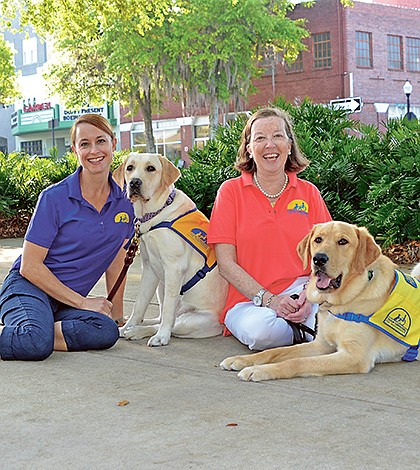- July 26, 2024
-
-
Loading

Loading

WINTER GARDEN — Kermit and Glow are frequent visitors in downtown Winter Garden, both wearing fashionable yellow capes that identify them as heroes in the making. These puppies, a yellow Labrador and a lab-golden retriever mix, are on the brink of adulthood and will one day become everyday heroes to someone in need of an assistance dog through Canine Companions for Independence.
Kermit is 17 months old and has been with Robin Sanchez since January 2014, arriving at her home when he was 8 weeks old. Glow is 11 months old and has been staying with Erika Dold and her family since last June, when she, too, was 2 months old.
The trainers must teach the dogs about 30 commands, from sit and heel to jump and under, as well as basic obedience instruction. The dogs will remain under Sanchez’s and Dold’s tutelage for 16 months, and then they are returned to the Southeast Region of CCI for additional professional training.
Socializing is an important part of the training, so Sanchez and Dold are often downtown, mingling with people on the West Orange Trail, at the Winter Garden Farmers Market and near the interactive splash pad. The dogs must become familiar with and learn how to properly behave in crowds and around traffic.
Kermit has been to restaurants, malls, theme parks, grocery stores and museums, Sanchez said.
“We take him where there are distractions and new experiences to see how he reacts and use it as a training session,” she said.
Glow accompanies Dold to her son’s Little League games and her daughter’s dance company, to the grocery store and to local restaurants. She goes on elevators, into restaurants and to doctor appointments.
“We socialize her by introducing her to new people, animals and experiences,” Dold said. “We try to expose her to things she will encounter when she is paired with her recipient.
Dold’s children, who are 7 and 10, have a hand in the training, too, attending bi-weekly classes when their schedule allows and helping with the day-to-day chores like feeding and brushing.
GIFT OF INDEPENDENCE
Sanchez has about five weeks before she has to turn in Kermit. This is the third puppy she has raised, and she said it is hard to give them up each time. But she understands the importance of the program and is proud to be part of it.
“Independence is the greatest gift I can give the individual when they receive one of our dogs,” she said. “Giving back to CCI has become the highlight of my life and has shaped me in so many ways.”
She has been so involved in the organization that a puppy was named for her.
Glow is the Dold family’s first experience with raising a puppy. Dold said she learned about the program while volunteering at CCI’s southeast regional office, located just east of Ocoee on Ocoee Clarcona Road, and she knew this was something she wanted to do with her children.
“We know the amazingly positive impact a dog can have in someone’s life,” she said. “And we also puppy-raise to remind ourselves and to teach our children the importance of giving to another person, sacrifice and kindness. It will be tremendously sad when we say goodbye to Glow, but we will be comforted knowing she will be helping to improve the life of her recipient.”
When Glow and Kermit are back at CCI, they will take part in additional training and then will be matched up with a recipient.
“CCI works very hard to find the perfect match for each dog and person,” Dold said.
Canine Companions for Independence trains and places four types of dogs: hearing (to alert the deaf and hard of hearing to important sounds), service (which assists adults with physical disabilities by performing daily tasks), facility (which works with a professional in a visitation, education or healthcare setting) and skilled companion (to enhance independence for children and adults with physical, cognitive and developmental disabilities).
Martha Johnson, public relations coordinator for the southeast region, said the February class was diverse and included dogs such as Doug IV, Peyton III and Newport II.
Doug IV was placed as a service dog with a 52-year-old man who had suffered a stroke and was left with cognitive issues and limited use of his right side and in a wheelchair. His dog will pick up things and will also help him practice his speech. Doug also will help him regain his independence so he does not have to rely on his family.
Peyton III was placed as a facility dog and is working with a guidance counselor in a local private school to help children with gross motor skills, behavioral problems and processing disorders.
“One of the most valued qualities of a facility dog is the unconditional love and attention it gives to everyone with whom it interacts,” Johnson said.
Newport II was placed as a skilled-companion dog and works with a 21-year-old woman who has developmental delays and other disabilities. A skilled companion team must have a “facilitator” who is part of the team and is primarily responsible for handling the dog. In this case, it is the woman’s mother.
Canine Companions for Independence provides trained assistance dogs to children and adults with disabilities. Established in 1975, CCI has six regional centers across the country, as well as its own breeding program in California. For more information visit cci.org or call (800) 572-BARK.
There is no charge for the dog, its training and ongoing follow-up services. Charitable contributions, grants, special events and corporate support fund the costs involved with this process. The southeast regional office is at 8150 Clarcona Ocoee Road, Orlando.
Contact Amy Quesinberry Rhode at [email protected].